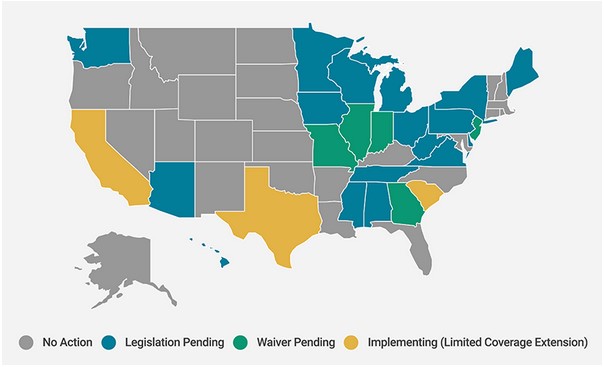The state of maternal health is quite bleak in the US, where women are more likely to die from childbirth or pregnancy-related causes than their counterparts in other developed countries. After years of advocacy, legislation was enacted that allows states to extend post-partum health care coverage. Could this mean more legislative proposals on maternal health could be enacted soon?
Pregnancy Crisis
There are significant maternal health disparities in the US, as black and Native Americans women are about three times more likely to die from pregnancy-related causes than white women. The COVID-19 pandemic has further exacerbated the nation’s maternal health crisis by negatively impacting social determinants of health, reducing access to care, and straining social support networks.
Medicaid Postpartum Coverage
Signed into law on March 11, 2021, the American Rescue Plan Act gives states the option to extend Medicaid postpartum coverage from 60 days to 12 months. Under this new coverage option, participating states must provide full Medicaid benefits both during pregnancy and the extended post-partum period. However, questions remain about the potential impact of the new coverage option, which does not go into effect until April 1, 2022 and only lasts for five years. For instance, it is not known how many states will elect the postpartum coverage option, particularly those that have expanded Medicaid coverage. The impact of the law in non-expansion states remains uncertain, as well.
Status of State Efforts to Expand Postpartum Coverage Beyond 60 Days

Source: Health Affairs
Mommy Bills in the Hopper
Additional efforts to bolster maternal health are underway in Congress. Key legislation introduced so far includes:
- The Maternal Health Momnibus Act (S. 346/H.R. 959). This bill would promote maternal vaccinations, encourage innovative payment models to support high-quality maternal care, and improve data collection to better understand the drivers of poor maternal health.
MOMMA’s Act (S. 916/H.R. 1897). This legislation would expand Medicaid and CHIP benefits for pregnant women to include oral health services, give states the option to extend SNAP benefits to women for two years postpartum, and establish Centers of Excellence on cultural competency training for health care providers.
- The Maternal Health Quality Improvement Act (H.R. 4995). This bill would require the Health Resources and Services Administration to establish programs aimed at improving maternal health care in rural areas, including physician training grant programs and grants for networks that can increase access and coordinate care for pregnant women. The bill advanced in the House but failed to be enacted.
For his part, President Biden’s American Families Plan, while centered around childcare, education, and paid leave, will “invest in maternal health” according to a fact sheet. The American Families Plan could ultimately provide a legislative vehicle, to enact maternal health proposals, much like the Medicaid postpartum coverage bill was attached to the American Rescue Plan.

